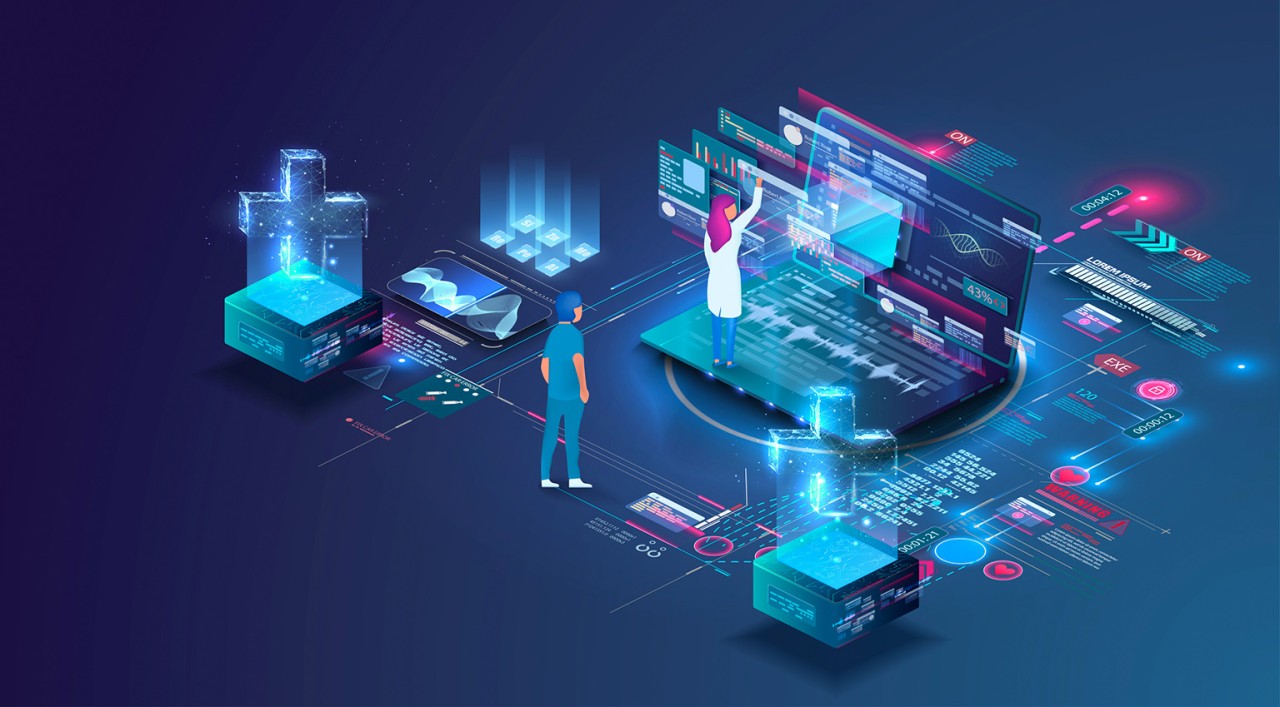The Future of Medicine: How AI is Transforming Healthcare
The integration of artificial intelligence (AI) into healthcare is revolutionizing the medical field. AI's ability to analyze vast amounts of data, identify patterns, and make predictions is enhancing diagnostic accuracy, personalizing treatment plans, and optimizing patient outcomes.
This article explores the profound impact of AI on healthcare, highlighting key areas where AI is making a significant difference and the future prospects of this technology.
Enhancing Diagnostic Accuracy
AI in Medical Imaging
 AI's capability to analyze medical images surpasses traditional methods. Machine learning algorithms can scrutinize X-rays, MRIs, and CT scans with incredible precision, often detecting anomalies that might be missed by human eyes. For instance, AI systems have been developed to identify early signs of cancer, such as breast and lung cancer, with remarkable accuracy.
AI's capability to analyze medical images surpasses traditional methods. Machine learning algorithms can scrutinize X-rays, MRIs, and CT scans with incredible precision, often detecting anomalies that might be missed by human eyes. For instance, AI systems have been developed to identify early signs of cancer, such as breast and lung cancer, with remarkable accuracy.
By training on thousands of images, these systems learn to recognize the subtle cues that indicate disease, leading to earlier and more accurate diagnoses.
Predictive Analytics
AI's predictive analytics can anticipate patient outcomes based on historical data. By examining a patient's medical history, lifestyle, and genetic information, AI can predict the likelihood of diseases such as diabetes, heart disease, and stroke. This predictive capability enables healthcare providers to intervene early, implementing preventive measures that can significantly improve patient prognosis and reduce healthcare costs.
Personalized Treatment Plans
Precision Medicine

Drug Discovery and Development
The process of drug discovery and development is notoriously time-consuming and expensive. AI is streamlining this process by predicting how different compounds will interact with target proteins, significantly speeding up the identification of potential new drugs. Furthermore, AI can analyze data from clinical trials to identify the most promising candidates, reducing the time and cost associated with bringing new drugs to market.
Optimizing Patient Outcomes
Virtual Health Assistants
Virtual health assistants, powered by AI, are transforming patient care by providing 24/7 support and monitoring. These AI-driven tools can answer patient queries, remind them to take their medications, and monitor vital signs.
For instance, AI-powered chatbots can engage with patients to provide health advice, schedule appointments, and even offer mental health support. This continuous monitoring and support can lead to better adherence to treatment plans and improved health outcomes.
Remote Patient Monitoring
AI-powered remote patient monitoring devices allow for continuous tracking of patients' health metrics, such as heart rate, blood pressure, and glucose levels. These devices send real-time data to healthcare providers, enabling early detection of potential health issues and timely interventions.
This technology is particularly beneficial for managing chronic conditions, as it allows for proactive rather than reactive care, ultimately improving patient outcomes and reducing hospital readmissions.
Future Prospects of AI in Healthcare
Integration with Electronic Health Records (EHRs)
The integration of AI with EHRs holds great promise for improving healthcare delivery. AI can analyze EHR data to identify trends, flag potential issues, and provide clinical decision support. For example, AI algorithms can sift through a patient’s medical history to recommend personalized treatment plans or identify patients at risk of developing certain conditions.
This seamless integration enhances the efficiency and effectiveness of healthcare providers, allowing them to focus more on patient care.
Ethical Considerations and Challenges
Despite the numerous benefits, the integration of AI in healthcare also raises ethical considerations and challenges. Issues such as data privacy, algorithmic bias, and the need for transparency in AI decision-making processes must be addressed. Ensuring that AI systems are trained on diverse datasets and implementing robust data protection measures are crucial steps in mitigating these challenges.
Moreover, involving healthcare professionals in the development and deployment of AI technologies can ensure that these tools are used ethically and effectively.
Regulatory Frameworks
The rapid advancement of AI in healthcare necessitates the development of comprehensive regulatory frameworks. These frameworks should ensure the safety, efficacy, and ethical use of AI technologies. Regulatory bodies must work closely with technology developers, healthcare providers, and patients to establish guidelines that promote innovation while safeguarding public health.
For instance, the FDA has started to develop guidelines for the approval and use of AI-based medical devices, setting a precedent for other regulatory agencies to follow.
Continuous Learning and Adaptation
AI technologies are not static; they continuously learn and adapt based on new data. This capability allows AI systems to improve over time, becoming more accurate and effective in their applications. For example, AI algorithms can refine their diagnostic capabilities by learning from new patient data, leading to more accurate predictions and better patient outcomes. Continuous learning and adaptation ensure that AI technologies remain at the cutting edge of medical advancements, driving ongoing improvements in healthcare.
Conclusion
The transformative potential of AI in healthcare is undeniable. From enhancing diagnostic accuracy and personalizing treatment plans to optimizing patient outcomes and addressing ethical considerations, AI is reshaping the medical field in profound ways. As technology continues to advance, the integration of AI in healthcare will undoubtedly lead to more efficient, effective, and personalized medical care, ultimately improving the quality of life for patients worldwide. Embracing these advancements while addressing the associated challenges will be key to unlocking the full potential of AI in healthcare.
Sources
NIH: AI in Medical Imaging
Harvard Business Review: AI in Healthcare
Mayo Clinic: Predictive Analytics
Nature: Precision Medicine
World Health Organization: Ethics of AI in Healthcare













































